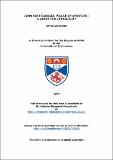John Bate Cardale, pillar of apostles : a quest for Catholicity
Abstract
John Bate Cardale (1802-l877) is the forgotten man
of the Catholic Apostolic Church. Edward Irving and Henry
Drummond who were both influential in the pre-history and
early days of the church received historical and biographical treatment long ago. Cardale, whose influence was
more decisive and longer lived than that of his two colleagues has until now been ignored. His life and works
show his personal participation in the quest for catholicity which was taking place in all churches during the
nineteenth century, a participation which was reflected
in the theology, worship and organization of the Catholic
Apostolic Church. The essentially hidden quality of
Cardale's life together with the Catholic Apostolic rule
of secrecy in regard to historic documents mean that insights into his life must be gained from the little material in the hands of descendants and from secondary sources.
The Catholic Apostolic Liturgy together with its two
volume theological commentary, Readings upon the Liturgy,
are Cardale's chief literary monuments. His lesser works
generally serve to illuminate minor themes not treated in
the Readings while his homiletic material is principally
devotional in character. Theologically Cardale is an
inheritor of the patristic and western catholic tradition.
He follows his mentor Irving in his understanding of the
Incarnation but breaks new ground in his doctrine of the
Church and its ministry by his unique exegesis of Ephesians
4:11-13. Cardale's approach to the dominical sacraments
is motivated by concern for theological truth and pastoral
nurture. The services Cardale compiled and revised in the
Liturgy seek to be based on theological principle, to meet
pastoral, psychological and devotional need and to draw
from the liturgical riches of ancient, Orthodox and western catholic traditions.
Cardale's gift of leadership, his theological precision and his liturgical creativity, the personal expressions of authority, tradition and comprehensiveness,
reacted to produce the most significant figure in the life
of the Catholic Apostolic Church and an important one on
the sidelines of nineteenth-century ecclesiastical history
in England.
Type
Thesis, BPhil Bachelor of Philosophy
Collections
Items in the St Andrews Research Repository are protected by copyright, with all rights reserved, unless otherwise indicated.

